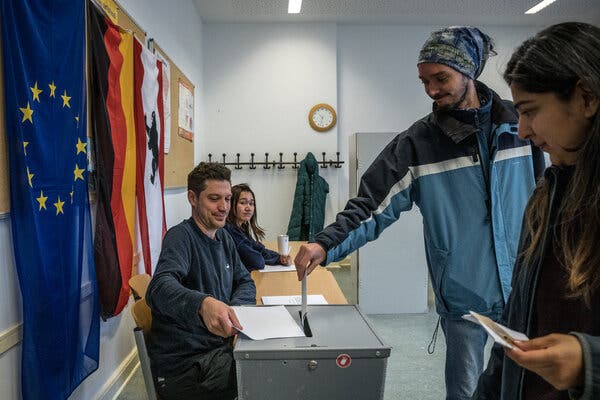Are you curious about how polling shapes the outcomes of elections in Germany? Understanding the nuances of German election polling can give you valuable insights into the political landscape and help you make sense of the shifting tides.
This analysis breaks down key polling trends, explores what they mean for the future, and highlights how public opinion can influence policy and governance. Whether you’re a political enthusiast or just looking to stay informed, this article will equip you with the knowledge you need to grasp the significance of these polls.
Stick around to discover what the latest numbers reveal about your vote and the future of Germany’s political scene.

Shifts In Voter Preferences
Voter preferences in Germany are changing. Different regions show unique trends. People in big cities vote differently than those in rural areas. Cities tend to support more progressive parties. Rural areas often favor traditional parties.
New political alliances are forming. These groups aim to attract more voters. They focus on issues that matter to the public. This shift can change the political landscape in Germany.
Young people are getting involved in elections. They care about issues like climate change and education. Their votes can sway the results. Engaging youth is important for all parties.
Rise Of Smaller Parties
The Green Party is gaining support in Germany. Their focus on environmental issues attracts many voters. People want action on climate change. This shift affects traditional parties. They must adapt to new ideas.
Far-right and far-left groups are also growing. The Far-Right appeals to those worried about immigration. They promise safety and national pride. The Far-Left focuses on social justice and economic change. Both groups draw away votes from traditional parties.
Traditional parties face big challenges. They struggle to connect with younger voters. Many people feel ignored by them. This change shows that voters want new options. The political landscape in Germany is changing quickly.
Impact Of Economic Concerns
Economic issues greatly affect voting choices in Germany. Unemployment is a major concern. Many people worry about losing their jobs. This fear can drive them to vote for change.
Wage stagnation adds to these worries. Workers feel they earn too little. They want better pay to support their families.
Public sentiment on inflation is also strong. Rising prices make everyday life harder. Many voters blame the government for this issue.
Energy policy plays a big role too. People want affordable energy and sustainable options. Their preferences shape how they vote. Candidates must address these topics to win support.
Role Of Social Media In Campaigning
Social media plays a big role in campaigning. It helps spread information quickly. Candidates use platforms to reach many people. Digital strategies can target specific groups. This makes messages more effective.
Political messaging spreads fast online. Many users share news with friends. This creates a larger audience. Videos, images, and posts catch attention. They make complex ideas easier to understand.
Misinformation is a big problem. False news can confuse voters. It spreads just as fast as real news. This affects how people think and vote. Checking sources is important. Always seek truthful information.
Voter Turnout Trends
Voter turnout in Germany shows interesting patterns. Urban areas often have higher participation. Rural areas may have lower turnout rates. This difference can impact election results.
Looking back at past elections, trends can be seen. Turnout has varied in different regions. Recent elections show urban voters are more active.
Several factors affect turnout. Public interest plays a big role. Access to polling places can also help or hinder voting. Weather can impact turnout too. Bad weather may keep people at home.
| Factor | Effect on Turnout |
|---|---|
| Public Interest | Increases turnout |
| Access to Polling | Facilitates voting |
| Weather | Can lower turnout |

Impact Of Global Issues
Climate changeis a big concern in Germany. Many people worry about its effects. This issue shapes the thoughts of voters. They want leaders who care about the planet.
Geopolitical tensionsalso matter. Events around the world influence local politics. Voters feel uneasy about conflicts. They look for strong leaders who can ensure safety.
The pandemic responsehas changed public opinion. People notice how leaders handle health crises. Trust in government can rise or fall based on actions. Voters want leaders who respond well to emergencies.
Future Implications
The German political landscape may see big changes soon. Poll results show possible new coalitions. Voters want fresh ideas and leadership. This could lead to new partnerships among parties.
Challenges in governance are likely. Different parties may have conflicting goals. This could make it hard to agree on important issues. Citizens want effective solutions to their problems.
Long-term trends point to a shifting focus. Issues like climate change and economy are now top priorities. Voters care more about social justice and equality. These shifts can shape the future of German politics.

Frequently Asked Questions
What Are The Latest German Election Polls?
The latest German election polls indicate fluctuating support among major parties. Recent surveys show the Social Democrats leading slightly, followed by the Christian Democrats. Additionally, the Greens and the far-right Alternative for Germany (AfD) continue to gain traction. Voter sentiment is dynamic, reflecting current political issues.
How Do Polls Impact German Elections?
Polling data significantly influences voter behavior and party strategies. Candidates use polls to tailor their campaigns and messaging. Additionally, media coverage of polls can shape public perception. However, polls are not always accurate predictors of election outcomes, as voter turnout and last-minute decisions play critical roles.
What Factors Affect German Election Polling?
Several factors impact German election polling, including economic conditions, public sentiment, and party leadership. Major events, such as international crises or domestic policies, can sway voter opinions. Additionally, regional issues may influence local polling results. Understanding these factors helps interpret polling data more accurately.
Why Are German Election Polls Important?
German election polls provide crucial insights into voter preferences and party popularity. They help parties gauge their electoral strategies and adapt to changing sentiments. Furthermore, polls can highlight emerging trends and issues. This information is vital for political analysts, journalists, and voters alike.
Conclusion
The German election polling shows important trends. Voter preferences shift as issues change. Understanding these polls helps us predict outcomes. Public opinion shapes political strategies. Candidates must connect with voters. Stay informed about the latest updates. This knowledge prepares us for what’s next.
Active engagement is crucial in a democracy. Keep an eye on the polls for insights. Your voice matters in shaping the future.
Read More:
- Global Supply‑Chain Disruption Alerts: Navigating the Chaos
- Smart Grid Pilot Program Launches: Revolutionizing Energy Use
- Next‑Gen Renewable Energy Storage Updates: Breaking Innovations
- Us Midterm Election Impact Analysis: Key Takeaways & Trends
- New Data‑Privacy Law Enforcement Cases: Unveiling Insights
- Mental‑Health Teletherapy Adoption Rates: A Rising Trend
- Ethereum Shanghai Upgrade Analysis: Unveiling Key Insights
- Bitcoin ETF Approval Timeline: Navigating the Future

